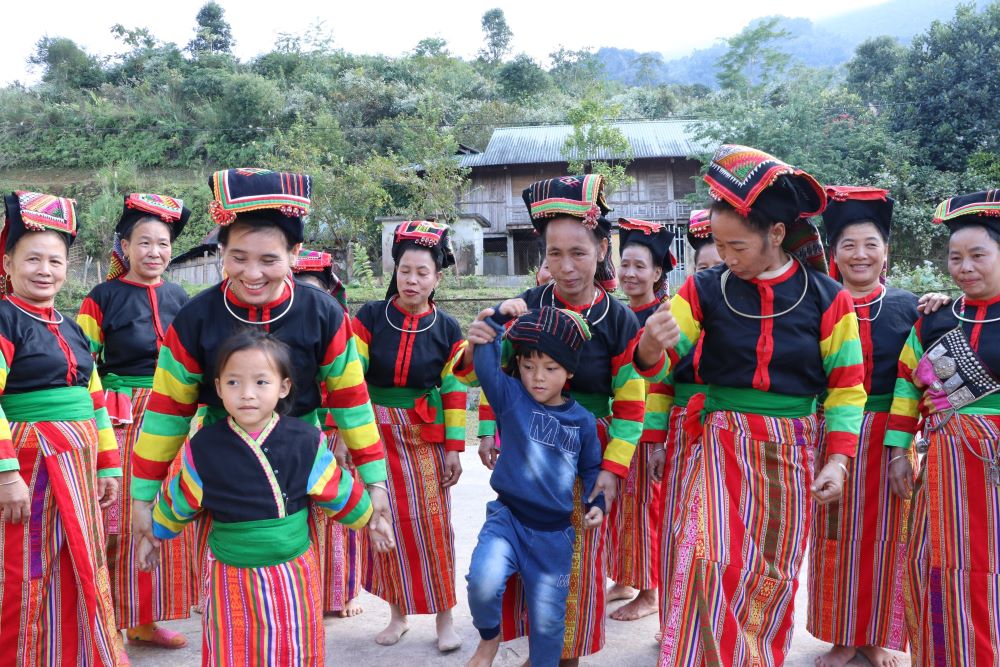Vietnam takes action on women, peace, security
Vietnam’s national action plan is formed on four pillars of the women, peace, and security agenda: participation, protection, prevention, and relief and recovery.
The Government of Vietnam has made a historic milestone when it launched the country’s first National Action Plan on Women, Peace, and Security (NAP WPS), demonstrating its commitment to gender equality and women’s empowerment in the field of peace and security.
| Cong ethnic women in Vietnam's northern province of Lai Chau teach their children traditional rituals. Photo: Tran Van Hoang/VNA |
The first NAP WPS is built based on the four pillars of the WPS agenda, namely participation, protection, prevention, and relief and recovery. There’s also a section on international cooperation, which highlights Vietnam’s commitment to working with the international community to further the WPS agenda.
“The launch of Vietnam’s National Action Plan comes at a critical juncture with global challenges impacting us all. Women and girls all around the world continue to face disproportionate vulnerabilities and discrimination making this national action plan more crucial than ever,” said Sima Bahous, Executive Director of UN Women.
She affirmed that UN Women stands ready to support the government of Vietnam to extend the partnership and leverage resources to ensure that no woman or girl is left behind.
The NAP WPS integrates gender into its response to conflict, crisis, disaster, and emerging security challenges like cyber security and climate change. It outlines the goals of women's full, equal, and meaningful participation in politics, diplomacy, national defense, security, and addressing gender-based violence.
On this occasion, a workshop was conducted to develop the delivery plan of the NAP WPS led by Vietnam’s Ministry of Foreign Affairs and UN Women for effective implementation of the plan. The plan to improve the lives of women and girls as well as the larger initiatives to maintain peace in Vietnam were found to be primarily fueled by investment, strong partnership, and clear coordination.
Ryce Chanchai, ASEAN Governance and ASEAN WPS Regional Programme Lead of UN Women, said the WPS agenda is wide-ranging and cross-cutting. It requires effective coordination among multi-stakeholders, including leaders and managers at all levels: provinces, ministries, national women’s machinery, academia, civil society, community-based, and women’s organizations.
In the case of Vietnam, a clear and measurable plan for implementation provides a strong basis for financing and calls for increased investment in the WPS agenda with results that can be measured. In turn, this will keep the momentum and continue to garner political support from key relevant line ministries and agencies in the country.
According to experts, Vietnam has made significant progress in gender equality demonstrating the political will and drive towards gender equality including Improved global ranking on gender equality from 83rd to 72nd out of 146 countries since the adoption of the 2030 Agenda for Sustainable Development; Enactment of Gender Equality Law (2006) and the National Strategy on Gender Equality (2021-2030), and the Domestic Violence and Protection Law (2022).
Vietnam has been a strong supporter of the Women, Peace, and Security Agenda on a global scale. It led to the proposal of the UN Security Council Resolution 1889 in 2009 focusing on women’s role in post-conflict peacebuilding.
During its tenure as a non-permanent member of the UN Security Council (2020-2021), Vietnam hosted an international conference themed "Enhancing Women’s Role in Peace Building and Consolidation: From Commitments to Results," adopting the Hanoi Commitment to Action with the co-sponsorship of 75 UN member states.
Most recently, Vietnam’s acceptance to join the UN Women’s Executive Board for the 2025–2027 term serves as more evidence of the country’s commitment to advancing gender equality.
Since 2021, UN Women has worked with the Ministry of Foreign Affairs to provide technical assistance to the government in developing the NAP WPS, with assistance from the governments of Australia, Canada, South Korea, and the UK.
Hanoi has taken proactive steps in addressing the Women, Peace, and Security (WPS) agenda, which aligns with United Nations Security Council Resolution 1325 and its subsequent resolutions. Vietnam, and particularly Hanoi, has integrated the WPS agenda into national policies, promoting gender equality, peacebuilding, and the protection of women’s rights in conflict and post-conflict situations. In terms of the National Action Plans (NAPs), Hanoi plays a significant role in implementing these plans at the national and local levels, focusing on protecting women's rights, preventing gender-based violence, and increasing women's participation in decision-making, especially in peace and security sectors. Hanoi has promoted the inclusion of women in peacekeeping missions, both regionally and internationally. Vietnamese women, including those from Hanoi, have increasingly taken part in UN peacekeeping operations, serving in roles such as medical officers, engineers, and field commanders, contributing to international peace and security. The capital city has hosted various workshops and advocacy events aimed at raising awareness of the WPS agenda. These events bring together government agencies, civil society organizations, and international partners to discuss strategies for enhancing women’s roles in peace and security, as well as addressing the challenges women face in conflict situations. The Hanoi government has incorporated gender perspectives into its policies, particularly in areas related to security and defense. This ensures that the needs and experiences of women are considered in national security strategies, conflict prevention, and peacebuilding efforts. The city works closely with the United Nations and other international bodies to implement the WPS agenda. This includes receiving technical and financial support to promote women's leadership and participation in peace and security matters. These efforts reflect Hanoi’s commitment to ensuring that women are not only protected during conflict but also play a key role in building and sustaining peace. |









